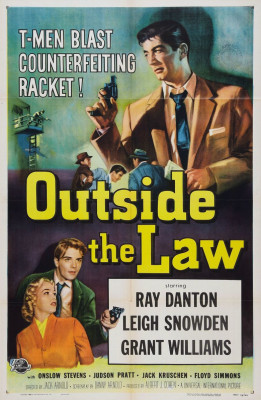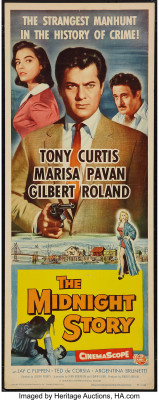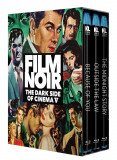| Reviews & Columns |
|
Reviews DVD TV on DVD Blu-ray 4K UHD International DVDs In Theaters Reviews by Studio Video Games Features Collector Series DVDs Easter Egg Database Interviews DVD Talk Radio Feature Articles Columns Anime Talk DVD Savant Horror DVDs The M.O.D. Squad Art House HD Talk Silent DVD
|
DVD Talk Forum |
|
|
| Resources |
|
DVD Price Search Customer Service #'s RCE Info Links |
|
Columns
|
|
|
Film Noir: The Dark Side of Cinema V (Because of You / Outside the Law / The Midnight Story)
Film Noir: The Dark Side of Cinema, Volume V is the latest set of three 1950s Universal-International titles. Though the labeling of some of these titles "noir" is highly debatable, and the majority of films in this series are mostly just average, it's still enormous fun to catch up with these largely forgotten, generally lesser films.
Because of You (1952), starring Loretta Young, is about 95% woman's "weepie," a female-targeted romantic melodrama, and only about 5% anything close to noir, certainly no more than 5 or 10 minutes of its 95-minute running time. Oregon farm girl Christine Carroll (Young), her hair dyed platinum-blonde, is about to marry Mike (Alex Nicol) when he slips something into her purse and she's nabbed by the cops. (Throughout the story, it's never explained just what Mike is trafficking, possibly drugs.) Unwitting accomplice Christine, unwilling to turn state's evidence against her fiancé, gets a long prison sentence.
In prison Christine begins to turn her life around, working as a nursing assistant in the prison infirmary. Released but on strict parole, she gets a job at a hospital caring for wounded soldiers, the story's first act being set during the war. There she and wounded combat pilot, wealthy Steve Kimberly (Jeff Chandler), fall in love, but partly due to his fragile mental state she's reluctant to reveal to him her time in the slammer. They marry, she gives birth to a daughter, and all seems idyllic until Mike turns up, threatening her and her daughter unless she drives Mike across the border into Mexico. What now?
Directed by Joseph Pevney, Because of You doesn't hold up well, except maybe as a vehicle for Loretta Young, who runs the gamut of emotions here. From a modern perspective, Christine goes from a controlling, possessive bad guy to a controlling, possessive good one. Unable to assert her own identity, she makes extraordinarily bad choices throughout the story, always in attempt to placate the alternatingly violent and needy men in her life. The obvious example is Christine's relationship with Steve, in its way as toxic as her romance with gangster Mike. Suffering from battle fatigue and family problems, Steve is sympathetic but she does him no favors complying to his need to always be in control. When she announces that she's pregnant, Steve's first reaction is fear: he doesn't want to have to complete with a baby for Christine's love.
With every setback, Christine's response each time is vague resignation, even after losing all legal rights to her daughter and screw-loose Steve gaining full custody. It's only the intervention of Steve empathetic sister, Susan (Frances Dee, appealing in a late-career role) that Christine has any chance of reuniting with her now six-year-old. Even here though, Susan has to pressure Christine before she, as always, complies and agrees to go along with Susan's plans to help bring the torn family back together.
The film is not without interest. Alex Nicol makes a particularly menacing bad guy. For a time, Christine goes to work as a magician's assistant (!), but the magician is played, in an unusually large role for a major film, by Phil Van Zandt, a character actor best known as a frequent foil of the Three Stooges. Both he and Young exhibit some real sleight-of-hand tricks in their scenes together. Mostly, though, Because of You is just okay for what it is, outrageous romantic melodrama, but it's a stretch to call it noir. (*** out of *****)
Directed by Jack Arnold, Outside the Law (1956) is a pretty ordinary noir crime film involving counterfeit $20 bills flooding early postwar Europe. It somewhat tepidly imitates the semi-documentary style launched by films such as The House on 92 Street (1945) and TV's Dragnet, but gets bogged-down in trite father-son issues played by miscast leads.
Ray Danton stars as Staff Sgt. Johnny Salvo, who served during the war to defer jail time and secure an early release. In 1946 Berlin, Johnny's army buddy and onetime cellmate, Corp. Harry Craven, is murdered, and once Johnny's back in the U.S. he's is questioned by Treasury Agents, though Johnny knew nothing about his casual friend's activities.
Nevertheless, the Treasury Department is ready to offer a full pardon if he'll agree to work undercover and get in touch with Craven's widow, but the man leading the investigation is Johnny's estranged father, agent Alec Conrad (Onslow Stevens), who turned hoodlum Johnny over to the police years before. Despite Johnny's bitterness, he accepts what he assumes will be an easy assignment.
He becomes friendly with Craven's widow, Maria (Leigh Snowden), but her psychotic boyfriend, Don Kastner (Grant Williams), has Johnny beaten in his hotel room and warned to lay off. Gradually the investigation leads to Maria's workplace, where Kastner also works, an import firm owned by Philip Bormann (Raymond Bailey).
While not a terrible time-killer, Outside the Law doesn't exactly light up the screen. Billed fourth, Onslow Stevens is really more or less the main character, anxious to use the investigation as a means to reconcile with Johnny, but also unwilling to apologize for sending his son up the river when he needed it. Stevens was a busy character actor but his screen persona was notably lacking in the warmth department; he was usually cast as officers in the Armed Forces and the like. The part may have been written for someone else, a Dean Jagger-type that might have come off better.
Ray Danton, for his part, is serviceable but no better; he was soon typecast as suave gangsters. Somewhat better is Grant Williams, his detached demeanor well-suited to the role of a cold-blooded killer. In the film's best scene, he watches, expressionless, as he has Johnny beaten to a pulp. Williams, who was gay and generally awkward in love scenes with women, comes off less well as Maria's possessive would-be lover.
Indeed, I realized Outside the Law wasn't working when I realized I cared a lot more about a supporting character, Agent Phil Schwartz (Jack Kruschen) than whether Johnny and his father ever made up. Kruschen was an incredibly busy actor working all over Hollywood in big and small films, nominated for an Academy Award as Best Supporting Actor in Billy Wilder's The Apartment the same year he played comic relief in the absurd The Angry Red Planet, and at a time he was still doing uncredited bits. In Outside the Law, he plays one of the workaday Treasury agents, so likeable genre tropes all but demand that he gets bumped off as a kind of sacrificial lamb to the narrative. So instead of caring what happened to Johnny and his father, or whether Maria will be in Johnny's arms at the fade-out, I was instead rooting for hard-working Agent Schwartz, hoping he'd make it until the final reel. (**1/2)
The blandly-titled The Midnight Story (1957), starring Tony Curtis, is far better than I was expecting, easily the best of the three titles. It's not a great, lost noir, but it is a quality programmer. Its story follows the usual tropes yet offers a number of surprises, the performances are good, and it generates an interesting, emotionally authentic atmosphere. Though primarily set within a stereotypical Italian-American family, little touches in the writing and performances bring that aspect to life, and long before the end the movie audience becomes emotionally invested in the outcome of its story. We care what happens to these people.
You'd never guess it'd be good based on its familiar premise: rookie San Francisco motorcycle cop Joe Martini (Curtis) is devastated when Catholic priest Father Tomasino, who all but raised the orphaned Martini, is fatally stabbed to death. At the beloved priest's funeral, Martini notices that Italian-American Sylvio Malatesta (Gilbert Roland) is so overcome with emotion, perhaps guilt, that he cuts his hands bloody holding onto his rosary. Unable to convince his superior, Lt. Kilrain (Ted de Corsia), to investigate Sylvio, Martini resigns his commission and works undercover as a poor local boy Sylvio hires on at his dockside restaurant and eventually welcomes into his home like a member of the family.
At the Malatesta home Martini becomes close not only with Sylvio, but also "Mama" Malatesta (Argentina Brunetti), Sylvio's kid brother, 16-year-old "Peanuts" (Richard Monda), and especially Sylvio's immigrant cousin Anna (Marisa Pavan). Quickly embraced, Martini begins feeling guilty about secret motives, openly expressing to his cop-mentor friend, Sgt. Jack Gillen (Jay C. Flippen), that he hopes Sylvio isn't Tomasino's murderer. Clues point in both directions, suggesting Sylvio had a solid alibi for the time of the killing, while other evidence, such as Sylvio's insomnia and obvious suppressed guilt about something, imply that he might be the priest's killer after all.
The movie was based on an episode of the Lux Video Theatre, a television anthology that mostly adapted old Hollywood movies. "The Eyes of Father Tomasino," a much better title, was an original work by Edwin Blum, whose widely varied credits include Adventures of Sherlock Holmes (1939), the screenplay for Stalag 17 (1953), and the story for Gung Ho (1986), his last film credit. The TV version starred Keefe Brasselle as Martini, Joe De Santis as Sylvio, and Gloria Talbott as Anna.
Admirably, the movie does a fine job keeping viewers guessing about Sylvio's guilt or innocence, and its resolution in the final minutes of the film offers a couple of surprises. Tony Curtis gives a committed, sincere performance; he's actually quite good. Also fine is Gilbert Roland, to the point where audiences probably don't realize that he's actually older than the actress playing his mother, or that there's an age different of nearly 45 years between him and the actor playing his kid brother. (Roland's career stretched from the silent era to the 1980s, during which time he hardly aged at all.) Marisa Pavan, the twin sister of Pier Angeli, was rarely used well in Hollywood movies and on television, but here gets to play a believable, interesting character. Richard Monda, playing the teenaged brother, is another pleasant surprise: he acts and talks like a real teenager, not a 1950s Hollywood-imagined one. Indeed, while Italian-American family clichés abound, the script and the playing make them seem more real than usual. (****)
Video & Audio
Licensed to Kino Lorber by Universal, all three transfers, in 1.37:1 standard, 1.85:1 widescreen, and 2.35:1 CinemaScope, and all in black-and-white, look great. Likewise, the DTS-HD Master audio (2.0 mono) is strong on all three titles, and optional English subtitle are provided on these Region "A" discs, each getting its own Blu-ray case.
Extra Features
Supplements include trailers and audio commentaries on each title: Samm Deighan on Because of You, Richard Harlan Smith on Outside the Law, and Jason A. Ney on The Midnight Story.
Parting Thoughts
No lost classics here, but an entertaining mix nonetheless, and nicely presenting, Film Noir Volume V is Recommended.
Stuart Galbraith IV is the Kyoto-based film historian largely absent from reviewing these days while he restores a 200-year-old Japanese farmhouse.
|
| Popular Reviews |
| Sponsored Links |
|
|
| Sponsored Links |
|
|
| Release List | Reviews | Shop | Newsletter | Forum | DVD Giveaways | Blu-Ray | Advertise |
|
Copyright 2024 DVDTalk.com All Rights Reserved. Legal Info, Privacy Policy, Terms of Use,
Manage Preferences,
Your Privacy Choices | |||||||
















